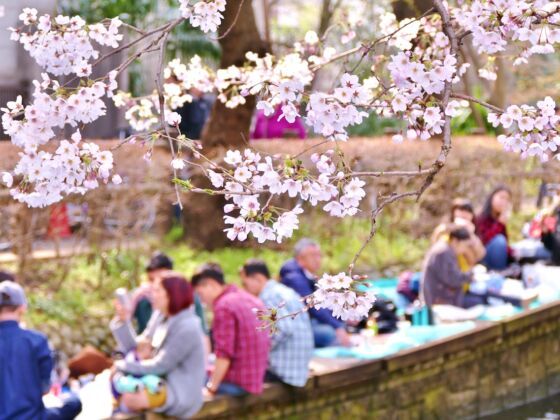MY FIRST TIME WAS AT KONO KOUEN (Kono Park) in Saga City, Japan. Some fellow Saga JETs and I had amassed a feel-good international delegation of English teachers, expats and Japanese friends laden with otsumami, greasy konbini karaage and a mélange of Kirin, Suntory Malts, and Sapporo. While most of my cohorts went straight to the kitschy pseudo amusement park area for yakitori and grilled ika, I got lost pacing the mini-canals. We eventually caught up, but not before I’d devoted an entire hour to lazing on the grass with an unlit Mild Seven in the corner of my lip. Above me: a sunshade of sakura (cherry blossoms) viewed through an upturned bottle of “One Cup” Ozeki. An infinity of silken butterfly wings conjured into glorious, fragile reality. Hanami.

How I Fell in Love With Hanami, the Japanese Tradition of Flower-Viewing
Hanami, or “flower viewing” is the one thing you absolutely must do in Japan. A foil to the infamous Japanese work ethic, it’s a time to come together with friends and family in a favorite park, bask in the fleeting beauty of the blooming cherry blossoms, and drink like Tanuki.
That first afternoon at Kono Kouen taught me where to get my annual dose of mesmerizing. Next year, we classed up the festivities with a heated “Haiku D’etat”: a no-holds barred haiku contest that I — in exercising my infinite wisdom and power as Kito District Representative and Official Facebook Event Creator — insisted was mandatory to all who came. In short order, the begrudging amateur poets allied against us “serious poets” and bribed the judges with plum wine. We were already horribly outnumbered, and our hastily carefully selected, impartial judges quickly joined succumbed to the mob. “DJ” Tony’s ending line, “Hepatitis Yo!”, won him the match and was celebrated as a triumph of impropriety. Breeze-carried blossoms played perfect backdrop. A slight, unassuming older man tapped me on the shoulder, briefly breaking the revelry… the best way tell it is a poem:
Scatter (散る)
There is a kanji, 散る, “chiru.”
It means “falling blossoms or leaves.”
It can also mean to die a noble death,
the way a soldier falls on the battlefield.
In Kono park, with “Karate” Tony,
I watched a shy man inscribe chiru’s true meaning
with cherry blossom petals scattered on the wind.
Introducing himself with the fumbling “Where are you from?”
we English speakers in this country typically brush off,
he unraveled his heart and asked me,
“Do Japanese people have good mind?”
hand upon his chest as he said the word “mind.”
I liked that. As I warmed, he continued in careful English
with the urgency of one who’s seen beyond the veil.
At 18, fighting Chinese and Americans in dual wars.
He saw everything. Swam through bloodbath.
Watched his friends die. He was lucky.
He learned to laugh again. To trust. He told us,
“Good mind, good heart, knows no country.”
Looking up at me he repeated that he was lucky
to see spring, to see the cherry blossoms.
“They are so beautiful, but live only for a short time.
Just like us. After they bloom, I often stand by the river,
saluting the petals as they float by.
I am lucky to be here, so I salute my fallen friends.”
When he finished, he slowly took off his hat,
bowed deeply, thanked us and walked away.
He never told us his name.
As I write this, the wind floats fallen soldiers
across my neck and onto the legs of my jeans.
Lives have rested between my fingers.
Today, I caught three in my palm.
Chiru. Visit Tokyo’s Ueno Park during late March/early April and you’ll see a boundless procession of sakura seekers commune under a blushing canopy of floral “sky.” The feeling is so ethereal, it’s truly akin to walking among the clouds. In 2014, surrounded on all sides by over 1200 cherry trees, Randa and I stepped gingerly into a small creak to picnic on two large river rocks. Inari-zushi and umeboshi potato chips kept us more or less silent as we took in the thousands of kindred weekend mystics. An endless stream of petals trickling by. Hanami.